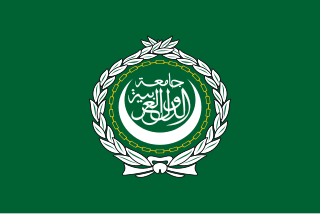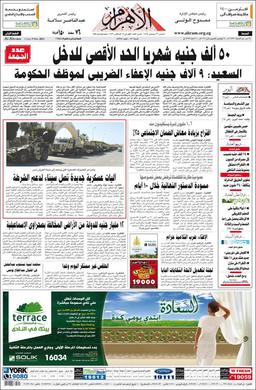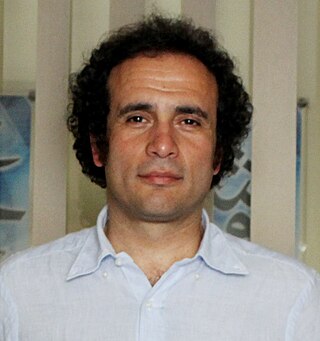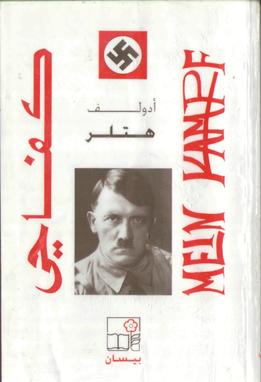
The Arab League, formally the League of Arab States, is a regional organization in the Arab world. The Arab League was formed in Cairo on 22 March 1945, initially with six members: Egypt, Iraq, Transjordan, Lebanon, Saudi Arabia, and Syria. Yemen joined as a member on 5 May 1945. Currently, the League has 22 members.

Amr Moussa is an Egyptian politician and diplomat who was the Secretary-General of the Arab League, a 22-member forum representing Arab states, from 1 June 2001 to 1 July 2011. Previously he served in the government of Egypt as Minister of Foreign Affairs from 1991 to 2001. On 8 September 2013, he was elected president of the committee of 50 that will amend the Egyptian constitution.

Al-Ahram, founded on 5 August 1876, is the most widely circulating Egyptian daily newspaper, and the second oldest after al-Waqa'i`al-Masriya. It is majority owned by the Egyptian government, and is considered a newspaper of record for Egypt.
Liberalism in Egypt or Egyptian liberalism is a political ideology that traces its beginnings to the 19th century.
The Cairo Conference against U.S. hegemony and war on Iraq and in solidarity with Palestine, generally known simply as Cairo Anti-war Conference, is an anti-war and anti-neo-liberalism conference held regularly since 2002 in Cairo, Egypt. The Cairo Conference set up the International Campaign Against Aggression on Iraq which helped to coordinate the worldwide demonstrations on 15 February 2003. In 2009, the Conference was banned by the government of former Egyptian President Hosni Mubarak.
The Nahda, also referred to as the Arab Awakening or Enlightenment, was a cultural movement that flourished in Arab-populated regions of the Ottoman Empire, notably in Egypt, Lebanon, Syria, and Tunisia, during the second half of the 19th century and the early 20th century.

The Cairo International Film Festival is an annual internationally accredited film festival held in Cairo Opera House. It was established in 1976 and has taken place every year since its inception, except for 2011 and 2013, when it was cancelled due to budget limitations and political instability. It is the only international competitive feature film festival recognized by the FIAPF in the Arab world and Africa, as well as the oldest in this category.

Amal al-Atrash, better known by her stage name Asmahan, was a Syrian-Egyptian singer.
Haidar Haidar was a Syrian writer and novelist. He acquired a wide reputation for his critical attitude towards political and religious institutions and his willingness to cover controversial topics in a rational way. He published seventeen books of fiction, short stories, essays and biography, including The Desolate Time, which was chosen by the Arab Writers Union as one of the best 105 books of the 20th century.

Ahmed Subhy Mansour is an Egyptian American activist, Islamic Quranist scholar dealing with Islamic history, culture, theology, and politics. He founded a small Egyptian Quranist group that is neither Sunni nor Shia, was exiled from Egypt, and lives in the United States as a political refugee.

The International Prize for Arabic Fiction (IPAF), also known as "the Arabic Booker," is regarded as the most prestigious and important literary prize in the Arab world.
Rose al-Yūsuf is an Arabic weekly political magazine published in Egypt.
Al-Ahram Hebdo is a French-language weekly newspaper in Egypt.

Abdel Hamid Sarraj was a Syrian Army officer and politician. When the union between Egypt and Syria was declared, Sarraj, a staunch Arab nationalist and supporter of Egyptian president Gamal Abdel Nasser, played a key role in the leadership of the Syrian region of the UAR. Due to the repression of the UAR towards the Syrian communists he was nicknamed Sultan Abdel Hamid referring to the Ottoman sultan Abdul Hamid II.

Mahmoud Saeed is an Iraqi-born American novelist.

The Arab League has 22 member states. It was founded in Cairo in March 1945 with six members: the Kingdom of Egypt, Kingdom of Iraq, Lebanon, Saudi Arabia, Syrian Republic, and Transjordan. North Yemen joined on 5 May 1945. Membership increased during the second half of the 20th century. Seven countries have observer status. The headquarters are located in Cairo, Egypt.

Amr Hamzawy is an Egyptian political scientist, human rights activist and public intellectual.

Mein Kampf, Adolf Hitler's 900-page autobiography outlining his political views, has been translated into Arabic a number of times since the early 1930s.

Azmi Bishara is a Palestinian-Israeli public intellectual, political philosopher and author. He is presently the General Director of the Arab Center for Research and Policy Studies and the Chair of the Board of Trustees of the Doha Institute for Graduate Studies.
The Riyadh International Book Fair (RIBF) is an annual book fair in Saudi Arabia. It lasts 11 days and regularly attracts over a half million visitors. The fair is used to showcase Saudi government policy, and it has been a locus of political power struggles with the government. Hundreds of publishers sell pre-approved books, and some black-market books. Writers take part in literary events. Invited speakers and the public discuss intellectual and social issues. Disagreements sometimes go beyond the bounds of debate, with speakers being shouted down and surrounded by protestors, and arrests of speakers and protestors; physical assaults are rare but not unknown.












